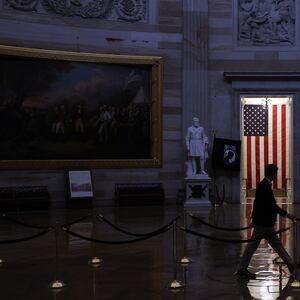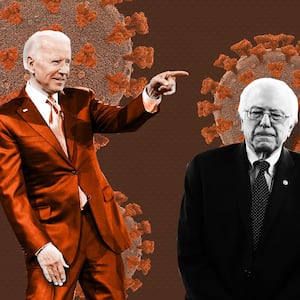In that way he has of saying out loud what many believe but won’t admit, Donald Trump made no pretense of his fear of vote by mail, describing why Republicans opposed mandated vote by mail in earlier versions of the $2 trillion emergency relief bill, despite the public health issues in sending voters to the polls in the midst of a pandemic:
“They had levels of voting, that if you ever agreed to it you'd never have a Republican elected in this country again, they had things in there about election days, and what you do… and it was totally crazy.”
To make this a perfect Trump moment, he himself has requested an absentee ballot for the Republican presidential primary in Florida.
Like with so many Trump opinions, he’s not only hypocritical here but he’s probably also wrong. In February of this year, the Knight Foundation did a survey of 12,000 non-voters (PDF). One of the conclusions: “While less partisan, non-voters are more evenly divided on key issues and on President Trump than active voters: Non-voters showed slightly more support for constructing a wall along the Mexican border than active voters, while being less supportive of replacing the Affordable Care Act. If they all voted in 2020, non-voters would add an almost equal share of votes to Democratic and Republican candidates.”
The poll analyzed key battleground states and found that if previous non-voter turnout surged, the benefits would be split among Democrats and Republicans: “The data by swing state shows that if all non- voters turned out for 2020, President Trump would be the non-voter favorite in Arizona, Florida, Pennsylvania, Virginia and New Hampshire, while the Democratic nominee would be favored by non-voters in Georgia, Michigan and Wisconsin. Their votes would be evenly split in Minnesota and Nevada.”
So why are Republicans afraid of making it easier to vote? It’s simple: the Republican Party base is white voters of middle to upper income voters, with strength among older voters. These have been traditionally the most reliable voters in low-turnout elections and Republicans are simply terrified by the idea of anything that might encourage increased non-white turnout.
It is a continuation down the path the party has been on since 1964 when African American support dropped from 39% for Eisenhower in 1956 to 7% for Goldwater. That vote never returned and while much was made for decades of the party’s need to expand their appeal, with Trump in 2016 that aspirational goal was all but abandoned for a full-throated embrace of white grievance politics.
More than half of Americans age 15 and younger are non-white. There is good reason to believe those citizens will eventually turn 18 and remain non-white. While the Republican Party might be able to squeeze another Electoral College win in 2020, the future of a non-inclusive party of white grievance is disastrous, the only question being the timing of a collapse.
When I first came to Washington, DC back in the 1980’s, I fell into doing a little writing for the Washington Monthly. At the time there was a writer-editor for the Monthly who had something of an obsession about the benefits of voting by mail. As I remember it, the idea was mostly humored the same way that Monthly founder Charles Peter’s obsession with small nuclear submarines was regarded. That’s interesting. But can we talk about the real world?
That writer-editor was Phil Keisling and to general surprise and some amusement, he moved back to Oregon with a plan to run for office and implement vote by mail. And damn if he didn’t get elected, first to the Oregon House of Representatives in 1988 and then Oregon Secretary of State in 1990. In a 2018 piece he wrote for The Oregonian, Keisling notes that while he is often called the “father of vote-by-mail,” he credits an earlier Secretary of State. Del Riley, who died last year at 93. However the credit is shared, Oregon has led the way in voting by mail, conducting the first all mail election in January, 1996 to replace Senator Robert Packwood, who resigned in an early sexual harassment scandal.
As a Republican political consultant, I worked on that campaign for the Republican nominee, Gordon Smith who lost to Ron Wyden, who is still in office. (Smith was subsequently elected in November, 1996 after Senator Mark Hatfield retired.) In that race it was fascinating to see the question “Who did you vote for” replace the standard “Who do you intend to vote for?” in polling questionnaires. A ballot was mailed to every registered voter and voter participation hit 66%, an extraordinarily high number for a special election in January when most people are focused on the Super Bowl and not politics. Now all of Oregon’s elections are held by mail and their participation rate is among the nation’s highest, hitting 68% in the 2016 presidential elections.
Which is exactly why many Republicans, including Trump, fear vote by mail. On average, making it easier to vote lowers the threshold for those voter groups with lower participation numbers, including lower income voters and younger voters. When they do vote, those groups tend to vote Democratic in large numbers.
That’s why you will hear much in the months ahead from Republicans about the possibility of voter fraud with vote by mail. That’s nonsense unsupported by data.
Absentee voting is just another word for vote by mail and Republicans have long been quite adept at tracking absentee ballot requests and following up to encourage likely Republican voters to turn in ballots. It’s called “absentee chase” and generations of young Republican operatives have started out in politics executing the program. With the exception of the extraordinary and clumsy absentee scam in the North Carolina 9th Congressional district in 2016, there is no evidence absentees have been a source of voter fraud. Today Colorado, Hawaii, Oregon, Washington and Utah vote by mail, electing Democrat and Republicans with zero proof of fraud.
If out of this horrible pandemic tragedy Americans widely embraced vote by mail, it would well serve democracy and the nation. Illegal voting is a felony and the notion that out of all the felonies someone would chose to commit, they would pick voting vs., say, knocking off a 7-11, is a ludicrous fantasy. Our problem in America is getting people to vote when it is legal. Vote by mail would help.
Like on so many issues, Republicans should study the data, shut up and get out of the way of progress. As one of my favorite clients liked to say, “Be for the future. It’s going to happen anyway.”
So it is with vote by mail.








